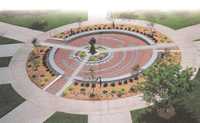
Gretchen Cassel Eick
is honored with a Brick from Michael Poage
Gretchen Eick, born December 17, 1942, in Fairview Park, Ohio, was the first child of the
Reverend Samuel H. and Virginia Cunningham Cassel. Their unhappy marriage led to her
mother leaving the marriage when Gretchen was eight. Her father remarried Hildred
Eversole four years later. Living in the same home until leaving for Kalamazoo College
and being raised by intelligent, creative and progressive parents, she was a confident young
woman when she traveled to newly independent Sierra Leone, West Africa, at age 19 for
six months of study at Fourah Bay College. The experience changed her life. She received
her master’s degree in 1965 in African history from Northwestern University as a
Woodrow Wilson Fellow. She chose not to pursue doctoral work in order to teach in the
newly integrated schools in New Haven, Connecticut, with her husband, Richard Eick.
Gretchen loved teaching, wrote the 7th grade sex ed curriculum and participated in
developing a “relevant” social studies curriculum. In 1968, the Eicks moved to the
Washington, D.C.–Maryland area where she found the smug, affluent schools of
Montgomery County stifling. She left teaching to raise their first child, Alyson, and
continued reading African American history, taught at Federal City College’s Upward
Bound program until their second daughter, Kendra, joined the family. For eight years,
Gretchen worked at home and volunteered to lead an anti-apartheid committee that
persuaded Maryland National Bank to stop making loans to South Africa. This was the
first successful “bank campaign.”
In 1977, she was hired as foreign and military policy advocate for the United Church of
Christ’s (UCC) Washington, D.C. national office on Capitol Hill, their first woman
professional. For 10 years, she lobbied Congress as part of a coalition of dedicated young
professionals. They succeeded in stopping Pentagon plans to continued production of nerve
gas and the MX missile, and achieved a ban on aid to Nicaragua’s anti-government
Contras and a Congressional vote over President Reagan’s veto to enforce full sanctions
against the white-minority government of South Africa. Her work was recognized in the
Washington Post, in two books on public policy and she received the Barbara Ward
Award from the Center for Theology and Public Policy. While working for UCC, she
made fact-finding trips to 29 countries.
In 1987, Gretchen became the executive director of the interreligious lobby – National
IMPACT. She increased its number of state affiliates and national religious organizations,
hosted a local TV program on public policy, and published IMPACT’s first book on how
to lobby. In 1991, after a divorce, she left Washington and moved to Lawrence, Kansas
with her second husband, Michael Poage. Unemployed for six months, she returned to
school at age 50 to pursue a doctorate at the University of Kansas in American Studies,
commuting to KU after moving to Wichita where she joined the faculty of Friends
University. In 2002, the University of Illinois Press will publish her book, “Dissent in
Wichita: The Civil Rights Movement and the Midwest, 1954-1972.”
During the spring semester of 2000, she taught at the University of Latvia, Riga, Latvia, on
a Fulbright Fellowship. She is the first Friends’ faculty member in the 100-year history of
the university to receive a Fulbright. She serves on the governing board of the United
Church of Christ, is active at Fairmount United Church of Christ, and delights in having
three generations of Eicks in Wichita.
Submitted by Michael Poage
May 1, 2001










